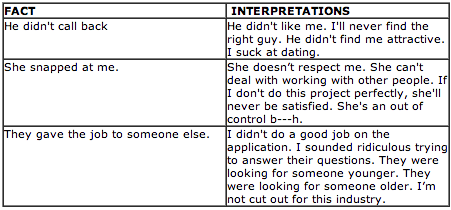
This is a post about a *very* helpful little question.
The question is: "What are you making this mean?"
As we walk through our lives, lots of ouches happen:
He didn't call back.
She snapped at me.
They gave the job to someone else.
Those are the facts.
We think we are upset about these facts -- about what actually happened: that he didn't call back! That she snapped at me like that! That they gave the job to someone else.
Usually, we are not, in fact, upset about the facts. We are upset about our interpretations of the facts, and particularly, when we take these facts to mean we are being attacked or rejected in some way.
It goes like this...

Listen today and you'll see: It's amazing how much of human "conversation" amounts to people ranting their own made-up interpretations of the facts. "She said blah! And if she said blah, she obviously has no respect for me. I mean, if you respect another human being, you would have said x not y. I decided a long time ago, I'm not going to work with people like that."
Whoa. Maybe she said that because she was in a load of pain. Or because she has a habit of losing her temper and hasn't learned to manage her emotions well.
Maybe it has nothing to do with you.
It's what we add on to the facts that makes us angry, resentful, defensive, hopeless, or self-hating. Because we are hardwired to be hyper-alert for any dangers to our survival, what we add on tends to reflects our worst fears and our particular negative conditioning.
Let go of the interpretation, and what's left? Sometimes, sadness and grief about what happened, yes, but without the feeling of being attacked, threatened, disrespected, or rejected.
Here's a simple, easy way to suffer a lot less:
1. When something upsets you, separate the facts from your interpretation. The facts will always be simple and short, like a movie plot without characters' personalities, without mood music. The facts sounds like short, "See Jane run" sentences: I sent in the job application. They called me for an interview. I did the interview. They called and said the job went to another candidate.
2. Then ask yourself, "What am I making that mean?" What interpretation am I laying on to those facts? See the difference between the facts and the story/interpretation you've layered on top of them.
3. If your interpretation is leading you to suffering, leading you to beat yourself up, or demonize others, question it. Be willing to let it go. It's not the truth. It's just one possible interpretation.
And most important:
If your interpretation holds you as anything less than an expression of the divine, let that interpretation go. If your interpretation holds anyone in the situation as less than an expression of the divine, let it go.
If your interpretation neglects the truth that people hurt others only out of their own suffering, weave that truth right back in to the center of how you view the situation. Let the wisdom of compassion transform what you see.
What is one interpretation you are holding that causes you suffering? What wiser, more compassionate interpretation will you replace it with now?
Love,
Tara
Tara Sophia Mohr is a writer, coach, and the creator of the Playing Big leadership program for women. Click HERE to get her free 10 Rules for Brilliant Women Workbook.
For more by Tara Sophia Mohr, click here.
For more on emotional intelligence, click here.